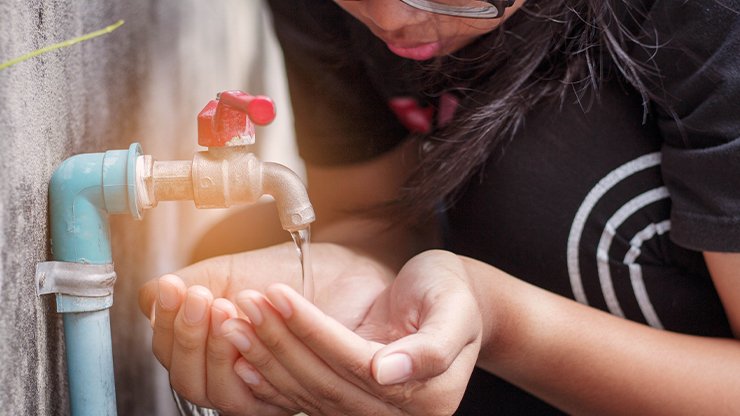Our Cause: Water for All
Why EmPower iRise Focuses on Water for All
At EmPower iRise, we believe that access to clean and safe water is a fundamental human right and a cornerstone for healthy communities. Water is essential for drinking, agriculture, sanitation, and numerous other activities that sustain life. Yet, millions of people around the world still lack access to clean water, resulting in severe health issues, economic hardship, and diminished quality of life. Our commitment to "Water for All" aims to address this critical issue and ensure that everyone, regardless of their geographic location or economic status, has access to clean and safe water.
The Importance of Clean Water:
- Health and Sanitation:
- Prevention of Waterborne Diseases: Contaminated water can transmit diseases such as cholera, dysentery, typhoid, and polio. Access to clean water prevents these illnesses, reducing mortality rates and improving overall health.
- Hygiene and Sanitation: Clean water is essential for maintaining hygiene and sanitation, crucial for preventing infections and ensuring public health.
- Agriculture and Food Security:
- Sustainable Agriculture: Clean water is necessary for irrigation, enabling farmers to grow crops that feed communities and support livelihoods.
- Food Production: Access to safe water improves the quality and quantity of food produced, enhancing food security and nutritional outcomes.
- Economic Development:
- Productivity: Healthy populations are more productive. Access to clean water reduces illness, allowing people to work and attend school regularly.
- Job Creation: Water-related projects and infrastructure development create jobs and stimulate local economies.
- Environmental Sustainability:
- Ecosystem Preservation: Clean water is vital for sustaining ecosystems that provide essential services such as pollination, climate regulation, and biodiversity.
- Pollution Reduction: Protecting water sources from pollution helps maintain the natural balance and reduces the environmental impact of human activities.
- Social Equity and Justice:
- Empowering Communities: Ensuring access to clean water is a matter of social justice, empowering marginalized communities and promoting equality.
- Women's Empowerment: In many communities, women and girls are responsible for fetching water. Access to nearby clean water sources frees up their time for education and economic activities.
Our Process to Ensure Water for All
To achieve our goal of providing clean and safe water for all, EmPower iRise implements a comprehensive and multi-faceted approach:
- Assessment and Monitoring:
- Water Quality Testing:
- Regular testing of water sources to identify contaminants and assess overall water quality.
- Example: Partnering with local laboratories to conduct monthly water quality assessments in rural areas.
- Impact Assessment:
- Evaluating the impact of industrial activities, agricultural practices, and waste management on local water sources.
- Example: Conducting community surveys to gather data on water-related health issues.
- Infrastructure Development:
- Water Treatment Facilities:
- Building and maintaining water treatment plants to purify water and remove contaminants.
- Example: Establishing a solar-powered water treatment facility in a remote village.
- Sanitation Systems:
- Developing sustainable sanitation systems to prevent water contamination.
- Example: Installing eco-friendly toilets in schools and community centers.
- Community Education and Awareness:
- Educational Workshops:
- Conducting workshops to educate communities about the importance of clean water and best practices for water conservation.
- Example: Organizing school programs to teach children about hygiene and sanitation.
- Awareness Campaigns:
- Launching campaigns to raise awareness about the causes and effects of water pollution.
- Example: Collaborating with local media to run public service announcements about water conservation.
- Sustainable Water Management:
- Rainwater Harvesting:
- Implementing rainwater harvesting systems to capture and store rainwater for future use.
- Example: Setting up rainwater collection tanks in drought-prone areas.
- Groundwater Recharge:
- Promoting techniques to replenish groundwater levels, such as constructing recharge wells.
- Example: Partnering with environmental NGOs to develop groundwater recharge projects.
- Advocacy and Policy Support:
- Policy Advocacy:
- Advocating for policies that support sustainable water management and protect water sources from pollution.
- Example: Working with local governments to enforce stricter regulations on industrial waste disposal.
- Community Involvement:
- Engaging communities in decision-making processes to ensure their needs are met.
- Example: Forming community water committees to oversee local water projects.
- Technology and Innovation:
- Innovative Purification Methods:
- Utilizing advanced technologies such as UV purification and bio-sand filters to ensure water quality.
- Example: Implementing portable water purifiers in disaster-stricken areas.
- Smart Water Management Systems:
- Integrating technology to monitor and manage water distribution efficiently.
- Example: Installing IoT-based sensors to track water usage and detect leaks.
- Collaboration and Partnerships:
- Local and International Partnerships:
- Collaborating with local organizations, governments, and international bodies to amplify our impact.
- Example: Partnering with the World Health Organization to implement water safety plans.
- Corporate Social Responsibility (CSR):
- Engaging with the private sector to support water-related projects through CSR initiatives.
- Example: Securing funding from corporations for large-scale water infrastructure projects.
Examples of Impact:
- Community Water Projects: Establishing community-managed water systems in rural areas, providing thousands with access to clean water.
- Emergency Water Aid: Delivering clean water and portable purification systems to disaster-affected regions.
- School Hygiene Programs: Implementing hygiene education and sanitation facilities in schools, improving student health and attendance.
Conclusion
At EmPower iRise, our commitment to "Water for All" is unwavering. By focusing on clean water initiatives, we aim to protect public health, support sustainable agriculture, foster economic development, preserve the environment, and promote social equity. Through a comprehensive approach that includes infrastructure development, education, sustainable management, advocacy, technology, and collaboration, we strive to ensure that everyone has access to the clean and safe water they need to thrive. Join us in this vital mission to make clean water accessible for all.

